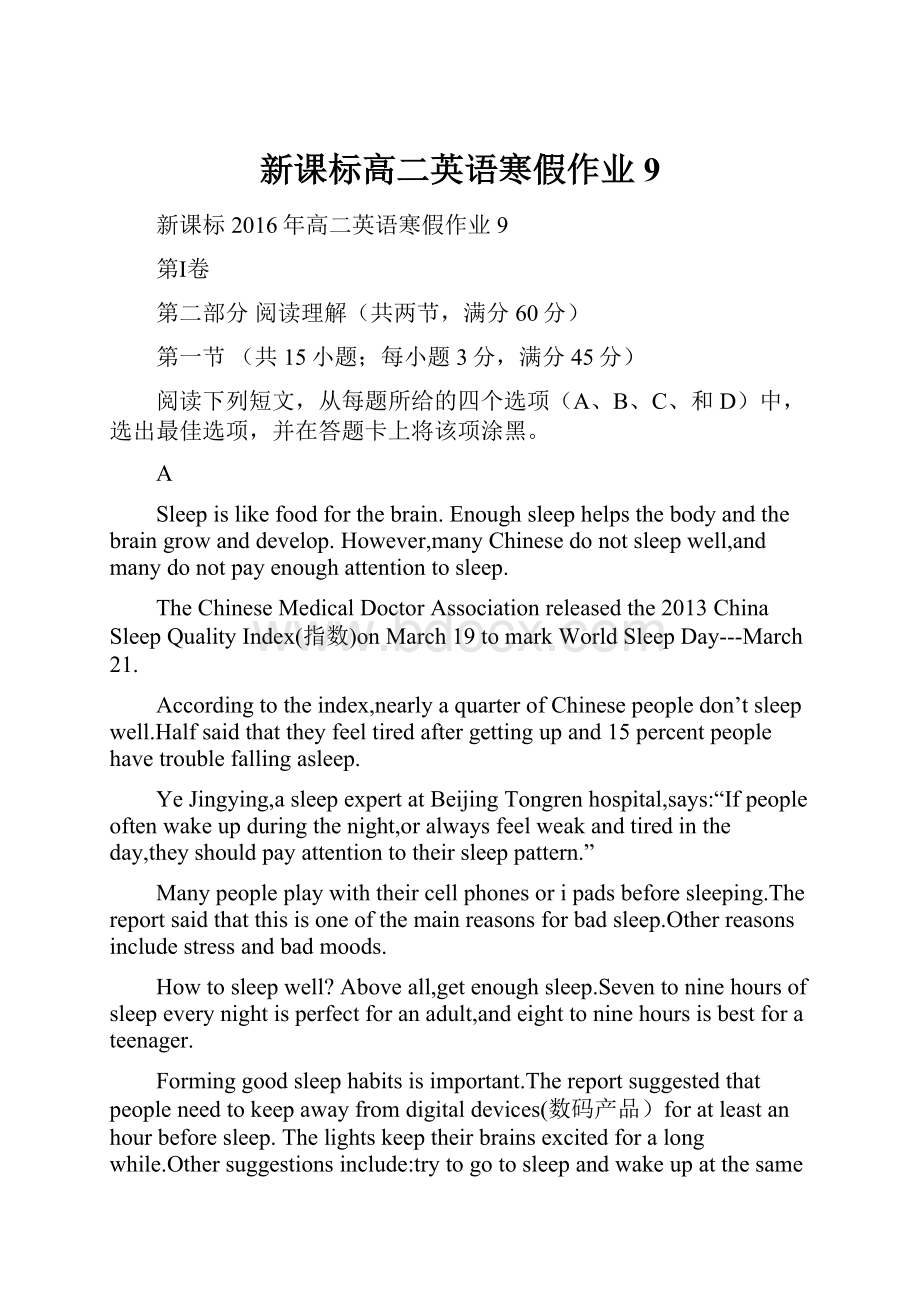新课标高二英语寒假作业9.docx
《新课标高二英语寒假作业9.docx》由会员分享,可在线阅读,更多相关《新课标高二英语寒假作业9.docx(15页珍藏版)》请在冰豆网上搜索。

新课标高二英语寒假作业9
新课标2016年高二英语寒假作业9
第Ⅰ卷
第二部分阅读理解(共两节,满分60分)
第一节(共15小题;每小题3分,满分45分)
阅读下列短文,从每题所给的四个选项(A、B、C、和D)中,选出最佳选项,并在答题卡上将该项涂黑。
A
Sleepislikefoodforthebrain.Enoughsleephelpsthebodyandthebraingrowanddevelop.However,manyChinesedonotsleepwell,andmanydonotpayenoughattentiontosleep.
TheChineseMedicalDoctorAssociationreleasedthe2013ChinaSleepQualityIndex(指数)onMarch19tomarkWorldSleepDay---March21.
Accordingtotheindex,nearlyaquarterofChinesepeopledon’tsleepwell.Halfsaidthattheyfeeltiredaftergettingupand15percentpeoplehavetroublefallingasleep.
YeJingying,asleepexpertatBeijingTongrenhospital,says:
“Ifpeopleoftenwakeupduringthenight,oralwaysfeelweakandtiredintheday,theyshouldpayattentiontotheirsleeppattern.”
Manypeopleplaywiththeircellphonesoripadsbeforesleeping.Thereportsaidthatthisisoneofthemainreasonsforbadsleep.Otherreasonsincludestressandbadmoods.
Howtosleepwell?
Aboveall,getenoughsleep.Seventoninehoursofsleepeverynightisperfectforanadult,andeighttoninehoursisbestforateenager.
Forminggoodsleephabitsisimportant.Thereportsuggestedthatpeopleneedtokeepawayfromdigitaldevices(数码产品)foratleastanhourbeforesleep.Thelightskeeptheirbrainsexcitedforalongwhile.Othersuggestionsinclude:
trytogotosleepandwakeupatthesametimeeveryday,evenonweekendsandduringholidays,anddothesamerelaxingthingsbeforebedeachnight,likelisteningtosoftmusic.
56.Accordingtothepassage,WorldSleepDayfallson_____.
A.March12B.March19C.March31D.March21
57.Whichofthefollowingmeansthatyousleepwell?
A.Youfeeltiredaftergettingup
B.Youwakeupseveraltimesduringthenight.
C.Youcanfallasleepwithin20minutes.
D.Youoftendosomethingboringuntilyoufeelsleepy.
58.Fromthearticle,WhichofthefollowingmayNOTcausesleepingproblems?
A.Havingsadorangryfeelings.
B.Readingabooklateatnight.
C.Playingwithdigitaldevicesbeforesleeping.
D.Beingunderstrongstressabouttheirlifeorwork.
B
A popular saying goes,“Sticks and stone may break my bones, but words will never hurt me.” However, that's not really true. Words have the power to build us up or tear us down. It doesn't matter if the words come from someone else or ourselves-the positive and negative effects are just as lasting.
We all talk to ourselves sometimes. We're usually too embarrassed to admit it, though. But we really shouldn't be, because more and more experts believe talking to ourselves out loud is a healthy habit.
This self-talk helps us motivate ourselves, remember things, solve problems, and calm ourselves down. Beware, though, that as much as 77% of self-talk tends to be negative. So in order to stay positive, we should only speak words of encouragement to ourselves. We should also be quick to give ourselves a pat on the back. The next time you finish a project, do well in a test, or finally clean your room, join me in saying,
“Good job !
”
Often, words come out of our mouths without our thinking about the effects they will have; but we should be aware that our words cause certain responses to others. For example, when returning an item to a store, we might use warm friendly language during the exchange. And the clerk will probably respond in a similar manner. Or we can use harsh, critical language, which will most likely cause the clerk to be defensive. Words possess power because of their lasting effects. Many of us regret something we once said.
And we remember unkind words said to us!
Before speaking, we should always ask ourselves:
Is it true?
Is it loving?
Is it needed?
If what we want to say doesn't pass this test, then it's better left unsaid.
Words possess power both positive and negative. Those around us receive encouragement when we speak positively. We can offer hope, build self-esteem(自尊)and motivate others to do their best. Negative words destroy all those things.
Will we use our words to hurt or to heal?
The choice is ours.
64. The author argues in the first paragraph that .
A. words have lasting effects on us B. words will never hurt us at all
C. positive effects last longer than negative effects
D. negative words may let us down
65. Why should we not feel embarrassed when talking to ourselves?
A. Almost everybody has the habit of talking to oneself.
B. Talking to ourselves is believed to be good for our health.
C. Talking to ourselves helps us to solve all the problems.
D. It does harm to have "self-talk" when we are alone.
66. Which of the following statements would the author agree to?
A. Unkind words are more likely to be forgotten.
B. It is better to think twice before talking to others.
C. Words always possess long positive effects.
D. Kind words are sometimes not needed at all.
67. Why should we talk in a friendly way when returning an item to a store?
A. Because kind words build u
p complex relationships.
B. Because the clerk in a store is hard to deal with.
C. Because friendly words cause positive responses.
D. Because critical language may hurt your feelings.
C
Today,home-ownershiphasreachedextremelyhighlevels.Moderngenerationstendtobelievethereissomethingwrongwiththemiftheyrent.However,ishighhome-ownershipreallyasrosyaspeopleimagine?
Staringatdatafirst,werealizethatthemostsuccessful,stable,attractivecountryintheWesternworldisSwitzerland.Ithastinyunemployment;wealth;highhappinessandmental-healthscores.Doesithavehighhome-ownershiprates?
Absolutelynot.InSwitzerland,aboutsevenintenofthepopulationarerenters.Yet,withEurope'slowesthome-ownershiprate,thenationthrives.Nowgototheotherendofthemiserydistribution.Spainhasapproximatelythehighesthome-ownershiprateinEurope(atmorethan80%).Butone-quarterofitspopulationareunemployed.
Alikelyreasonisthathighlevelsofhome-ownershipmessupthelabourmarket.Inasensiblyfunctioningeconomyitiseasyforpeopletomovearoundtodropintothevibrantjobslotsthrownupbytechnologicalchange.Withahighdegreeofowner-occupation,everythingslows.Folkgetstuck.Renterscangotonewjobs.Inthatwaytheydotheeconomyafavour.AsFriedmansaid,therateofunemploymentdependsontheflexibilityofthehousingmarket.
Nextwecometoeconomicbreakdown.Mostanalystsacceptthatatheartitwasthehousingmarket—obsessivepursuitofhomes,theengenderedmortgage(房贷)lendingandanunavoidablehouse-pricecrash—thatsanktheWesternworld.Germany,say,withitsmoreefficientrentalmarket,hadafarsmootherridethroughtrouble.
Asforthemonetarysystem,inthepastfewdecades,inthehopeofgettinguntaxedcapitalgainswayabovetheirtruelabourearnings,manypeoplethrewtheirsparecashintobuyinglargerhousesorbuildingextrabedrooms.TVprogrammesabouthowtomakeeasymoney,beautifulrisinghouseprices,andmostimportantly,ourfalultytaxsystemencouragedthat.Whenatsomepointmarketbrokedown,everyonesuffered.Ourcountriesought,instead,todesigntaxsystemsthatencouragepeopletoinvestinproductiverealactivitiesandininnovation.Rentingleavesmoneyfreeforbetterpurposes.
Thatalsopointstotheroleofsensiblebudgetingoveraperson'slifetime.Whyshouldwethinkthatwhenwedieitisnecessarytohavepaidoffanentirehouse?
Ourchildrendonotdeserveit.Letthempayforthemselves.Weshouldrent—andenjoyourliveswiththemoneysaved.
Finally,moderationusuallypaysoff.Ourscientificunderstandingofhoweconomiesfunctionishorriblylimited.Thissuggeststhatthegoldenruleshouldbetoavoidextremes.A50-50mixofhome-ownershipandrenting,notthe70-30splitthatisnowobservedinsomanyWesternnations,makessense.
82.ThecasesofSwitzerlandandSpainprovethat______.
A.lowhome-ownershiprateatabout30%ismostfavourableforeconomy
B.home-ownershipmainlydecidesacountry’scitizens’mentalhealth.
C.home-ownershiphasalottodowithacountry’stechnologicaldevelopment
D.lowhome-ownershipincreasesthemobilityofjobmarketandeconomy.
83.Themainreasontomakepeopleinvestinhousingmarketis______.
A.theproblematictaxingapproachfavouringhousebuying
B.people’sdesiretoavoidtheirmoneyfromdevaluing
C.easychannelstoobtainmethodstomakeeasymoney
D.people’swishestoliveinlargerandmorecomfortablehouses
84.WhichofthefollowingstatementsisTRUEaccordingtothepassage?
A.SwitzerlandsufferstheworseunemploymentinEurope.
B.Rentingallowsmoremoneyintomorecreativeeconomicactivities.
C.Germany’seffectivemortgagesystemsawitthroughthewesterneconomiccrisis.
D.Ourchildrenhavetherighttoenjoythehousingpropertywehavepaidoff.
85.Whatopiniondoestheauthoragreewithmost?
A.Peopleshouldlearntheworkingsofhousingmarket.
B.Lawsshouldbesetuptostoppeoplefrombuyinghouses.
C.Anadequaterateofhome-ownershipshouldbekept.
D.PeopleshouldfollowthegoodexampleofEuropeinhousinginvestment.
D
Asyoumovearoundyourhome,takeagoodlookatthethingsyouhave.Itislikelythatyourlivingroomwillhaveatelevisionsetandavideo,andyourkitchenawashingmachineandamicrowaveoven.Yourbedroomdrawerswillbefilledwithalmostthreetimesasmanyclothesasyonneed.Youalmostcertainlyownacarandpossiblyahomecomputer,holidayabroadatleastonceayearandeatoutatleastonceaweek.
Now,perhaps,morethaneverbefore,peoplearewonderingwhatlifeisallabout,andwhatitisfor.Seekingmaterialsuccessisbeginningtotroublelargenumbersofpeoplearoundtheworld.Theyfeelthatthelong-hoursworkculturetoma